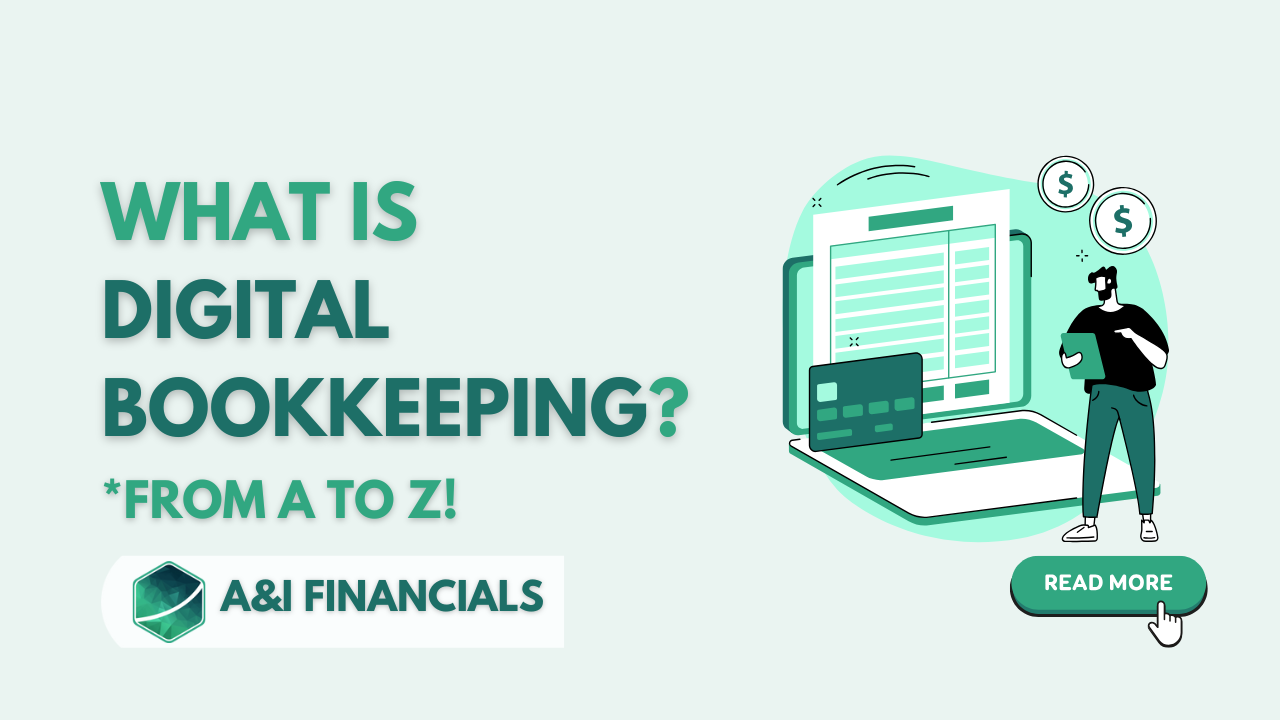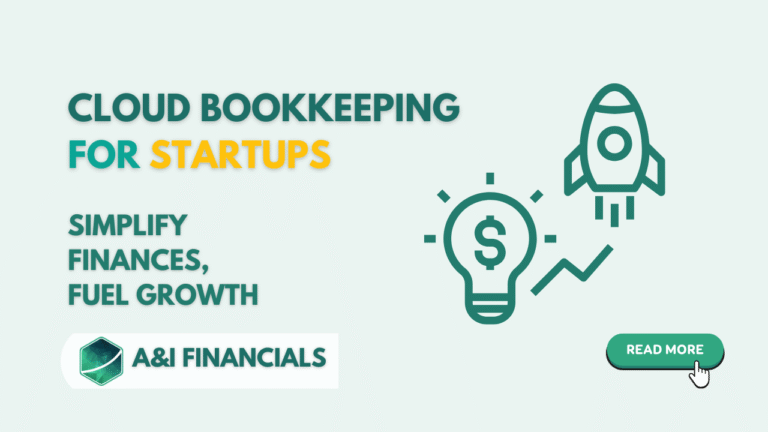What Is Digital Bookkeeping? From A to Z!
Digital bookkeeping is the modern way to manage financial records using technology. It takes traditional bookkeeping—think paper-based accounting and stacks of balance sheets—and transforms it into a seamless, efficient process. Gone are the days of cluttered office spaces and endless data entry. With digital tools, managing your finances becomes smarter, faster, and more cost-effective.
Why Digital Bookkeeping Matters Today
Imagine this: You’re a small business owner juggling everything from sales to customer service. Tracking financial transactions on paper or clunky spreadsheets can feel like carrying a heavy backpack uphill. Digital bookkeeping simplifies it all. By using cloud-based accounting software, you can manage financial data in real time, access it anywhere, and make better decisions for your business.
But let’s dig deeper. What exactly makes digital bookkeeping so revolutionary? How does it change the game for business owners, especially small ones?
Traditional Bookkeeping vs. Digital Bookkeeping
The Old Way: Traditional Bookkeeping
Traditional bookkeeping relied heavily on manual processes. This included:
- Paper-based accounting with ledgers and journals.
- Physically organizing receipts, invoices, and other documents.
- Limited access to financial information unless you were in the office.
While it worked for decades, it was time-consuming and prone to errors.
The New Way: Digital Bookkeeping
Digital bookkeeping eliminates most of these hassles.
By adopting accounting systems like QuickBooks or Xero, businesses shift to online bookkeeping, which is:
- Efficient: Automates data entry and calculations.
- Accessible: Lets you review financial records from any device.
- Secure: Stores your data safely in the cloud.
It’s like upgrading from a bicycle to a high-speed car. Both get you to your destination, but one does it faster, smoother, and with less effort.
The Core Benefits of Digital Bookkeeping
Real-Time Financial Insights
With traditional methods, financial reports like balance sheets took days—or even weeks—to compile. Digital bookkeeping offers real-time updates. Imagine knowing your business’s cash flow status with just a few clicks. This helps you make quick decisions, like whether you can afford to invest in new equipment or need to tighten spending.
Cost-Effective Solutions
Hiring full-time bookkeepers or maintaining office space for paperwork can drain resources. With virtual bookkeeping services, small businesses can save on overhead costs.
Plus, subscription-based accounting systems often cost less than paying a traditional bookkeeper’s salary.
Enhanced Financial Management
Digital tools provide more than just storage for financial records. They offer features to manage their finances better:
- Track income and expenses.
- Generate invoices and financial statements.
- Monitor tax obligations.
This not only saves time but ensures compliance with financial regulations.
Error Reduction
Manual data entry is prone to mistakes. Even a small typo can throw off your balance sheets. With digital bookkeeping, automated systems handle data entry, significantly reducing errors.
Key Features of Digital Bookkeeping
Cloud-Based Accounting Software
Platforms like QuickBooks, Xero, and FreshBooks are popular among business owners. These systems store data in the cloud, offering benefits like:
- Secure backups.
- Access from anywhere.
- Integration with other tools, like payment gateways.
Automated Financial Transactions
Say goodbye to manually entering every transaction. Digital bookkeeping systems sync with bank accounts and credit cards, pulling in financial data automatically.
Real-Time Data Entry
Digital bookkeeping doesn’t just store information; it processes it as it happens. Whether it’s a payment received or an expense incurred, you’ll see it reflected in your financial dashboard immediately.
How Digital Bookkeeping Solves Common Business Problems
Problem 1: Time-Consuming Processes
Traditional bookkeeping often took hours of manual labor. Digital tools automate repetitive tasks, freeing up your time for more important aspects of your business.
Problem 2: Lack of Real-Time Insights
Many small businesses struggle with outdated financial data. Digital bookkeeping provides up-to-the-minute reports, so you always know where you stand.
Problem 3: Poor Cash Flow Management
Without a clear view of income and expenses, cash flow issues sneak up on you. Digital bookkeeping systems monitor this automatically, helping you stay in control.
Steps to Transition to Digital Bookkeeping
Moving from paper-based accounting to digital bookkeeping might feel overwhelming, but it’s simpler than you think. Here’s a quick guide:
Choose the Right Software
Look for cloud-based accounting software that fits your needs. Popular options include QuickBooks, Xero, and Wave.
Set Up Your Financial Data
Transfer existing records like balance sheets, invoices, and receipts into the new system. Many platforms offer migration tools to make this easier.
Automate Transactions
Link your business bank account and credit cards to your digital bookkeeping platform. This ensures financial transactions are updated in real time.
Train Your Team
If you have employees handling bookkeeping, ensure they understand the new system. Most software providers offer training resources.
Why Small Businesses Love Digital Bookkeeping
Small businesses, in particular, benefit from the cost-effective and efficient nature of digital bookkeeping. Here’s why:
- Affordable: Cloud-based tools cost less than hiring full-time staff.
- Scalable: Whether you’re a solo entrepreneur or growing rapidly, digital systems grow with you.
- Remote-Friendly: With virtual bookkeeping services, you don’t need a physical office space.
Digital Bookkeeping in Action: A Relatable Example
Let’s say you own a small bakery. You’re great at crafting delicious treats but struggle with managing your finances. Before digital bookkeeping, you might’ve spent hours sifting through receipts to calculate monthly expenses.
Now, with an app like Xero:
- Your sales and expenses are logged automatically.
- You can see profit margins on your smartphone.
- Invoices are sent directly to clients, with reminders for late payments.
It’s like having a personal assistant who never takes a day off.
The Future of Financial Management
As technology evolves, digital bookkeeping continues to improve. Artificial intelligence is being integrated into accounting systems, offering even smarter insights and automating more tasks. For instance, future tools might analyze your financial trends and suggest ways to improve your cash flow.
Digital Bookkeeping Software: Streamlining Financial Management
Here’s a list of popular digital bookkeeping software that simplifies financial management:
- QuickBooks Online: User-friendly and packed with features for tracking expenses, invoices, and taxes.
- Xero: Ideal for cloud-based collaboration, offering tools for managing financial data in real-time.
- FreshBooks: Specializes in invoicing and expense tracking, perfect for freelancers and small businesses.
- Wave: A free, cost-effective option for small businesses with basic bookkeeping needs.
- Zoho Books: Integrates seamlessly with other Zoho applications, making it a great choice for all-in-one business management.
- Sage Business Cloud Accounting: Offers advanced features for financial management and scalability.
- Kashoo: Simple and straightforward, great for startups and solo entrepreneurs.
- FreeAgent: Designed for freelancers and small businesses, offering easy-to-use accounting tools.
These tools automate tasks like data entry, financial reporting, and cash flow monitoring, making bookkeeping more efficient and error-free.
Digital/Virtual Bookkeeping Services Offered By A&I Financials
A&I Financials offers comprehensive virtual bookkeeping services tailored for entrepreneurs, startups, and small business owners. Their experienced team functions as an internal accounting department, handling tasks such as preparing financial statements, balance sheets, income statements, and federal tax returns.
By leveraging advanced technology, A&I Financials ensures accurate and efficient financial management, allowing clients to focus on their core business activities. Their commitment to excellence and personalized service has earned them a reputation as a trusted partner in the financial industry.
Common Misconceptions About Digital Bookkeeping
Myth 1: It’s Only for Tech-Savvy People
Truth: Most cloud-based accounting software is designed for simplicity. If you can use a smartphone, you can use digital bookkeeping tools.
Myth 2: It’s Too Expensive
Truth: While there’s an upfront cost, the savings in time and error reduction make it a cost-effective choice in the long run.
Myth 3: It Replaces Human Bookkeepers
Truth: Digital bookkeeping tools enhance what bookkeepers do, not replace them. Professionals still play a vital role in interpreting financial data.
Conclusion: Why Digital Bookkeeping Is a Game-Changer
So, what is digital bookkeeping? In simple terms, it’s the smarter way to manage your finances. Whether you’re a small business owner trying to stay on top of financial transactions or someone looking to simplify their balance sheets, digital bookkeeping offers real-time, cost-effective solutions.
Think of it as trading a dusty old toolbox for a sleek, all-in-one gadget. It saves time, reduces errors, and gives you a clear picture of your financial health—all without the headache of traditional bookkeeping. If you haven’t made the switch yet, now’s the perfect time to take your financial management to the next level.






